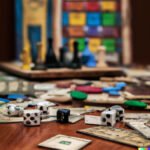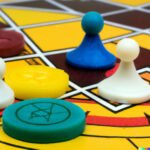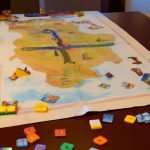Introduction to the World of Dungeons and Dragons Board Games
Dungeons and Dragons (D&D) board games have been around since the 1970s, and they have been a staple in fantasy game circles ever since. They exist in many different forms, from intense, story-driven tabletop campaigns to simple board games where players take on the roles of iconic adventurers like dwarves, elves, and dragons.
The world built around these board games is expansive and engaging, often incorporating many of the tropes seen in popular fantasy media. In addition to mythical creatures like orcs and ogres are political intrigue, religious organization, and story elements with intricate details carefully plotted out by its designer or game master.
The different kinds of D&D board games available depend on how invested people want to be in the world building process. For those looking for a ready-to-play experience there are occasionally released thematic boxed sets with everything you need included. For others who want to start from scratch there is a myriad of modular pieces which can be used to make custom campaigns or characters ” sometimes incorporating published adventure modules or pre-made settings for faster play. You can even find vintage editions still in circulation amongst older players and collectors!
For help getting started with these complex worlds it’s recommended that new players start by playing simplified versions first, such as those found at conventions or popular web apps like Roll20 ” where they can find advice from hardcore gamers willing to look over their rules shenanigans and guide newbies along their way.
At the end of all it comes down to why people enjoy these types of game so much ” immersion into an alternate world free from normal social protocol allows players to express themselves creatively while working together as a team on exciting quests with unpredictable outcomes – all whilst making friends along the way!
The Core Components of a Dungeons and Dragons Board Game
There are four core components of a Dungeons and Dragons board game: game pieces, dice, terrain, and other materials. Each component plays an important role in the success of a D&D game.
Game Pieces – The specific figurines or miniatures used in Dungeons & Dragons games are known as game pieces. These miniature pieces are designed to look like characters from the popular fantasy genre that has spawned millions of fans across the globe. Usually these pieces are printed on paper or plastic and come in a variety of sizes and shapes. Depending on which version of Dungeons & Dragons is being played will determine what type of game pieces should be purchased for use during playtime.
Dice – RPG gaming requires a certain amount of randomness and dice can provide this randomness depending on how the rules are set up for each session. Dice come in all sorts of varieties such as polyhedral dice with varied faces (ranging from 4-sided to 20-sided), normal 6-sided dice, special fate/fortune dice, battlemat combat dice (specialized for range & melee), etc. Having different types of dice can help make gameplay more enjoyable for participants by adding levels complexity to it as well as fun!
Terrain – Fake terrains are used during battles so players can get a better feel for the battlefield. A few examples include rising mountains that your fighters must scale back down again afterwards; tall trees that offer protection from enemies; steep hillsides; treacherous swamps; quick shifting sands; wooden bridges across deep chasms; and large walls built as fortifications against unwelcome invaders! All these small additions might not seem necessary at first, but they do add flavor to our board gaming sessions and helps create amazing stories within them too!
Other Materials – Aside from traditional paper cards and boards, there are things like character sheets which are filled with vital stats about each hero, spells written out with instructions on how to cast them correctly, monster databases (complete with biographies about their past) etc., which all make up valuable parts of any D&D experience. Often times these additional materials increase the difficulty level for players by making them think more tactics-wise so they can survive eventual encounters without taking major casualties or losing resources needlessly. Having access to helpful extras such as rule books with charts outlining damage mechanics can also be extremely beneficial when trying solve difficult complications posed by unexpected turns in battle scenarios!
Rules and Mechanics of Dungeons and Dragons Board Games
Dungeons and Dragons Board Games involve intricate rules that vary depending on the type of game being played. Generally, a single game turn involves a player rolling dice in order to determine the outcome of an action undertaken by their character. Depending on the game and player level, die rolls can be combined to form various combinations with varying effects.
In games like Dungeons & Dragons, each player is usually assigned to a certain character class and race, which defines their stats and capabilities throughout gameplay. With its expertise in fantasy fiction, Dungeons and Dragons board games explore a vast array of unique characters and classes available to pick from across multiple editions released over the years. There are also intricate rules governing which class is suitable for a given scenario based on factors such as difficulty level or tactical advantage.
Aside from characters, there are also specific narrative rules governing each stage of play including combat movement phases, dialog tree phases, interaction fees or taxes within certain levels, battle sequence mechanics and so forth. As your characters journey through these stages ” from strongholds out onto dangerous quests ” you must use strategic focus to survive grueling dungeons or party wipeouts created by massive dragon attacks (or even mysterious traps). With region-specific settings and spells that increase your magical powers during fights, no two games are ever truly the same!
How to Create a Character
Creating a character in Dungeons and Dragons board games is a process that requires time and thought. A player brings their unique vision of the character’s story to life by customizing it with traits, races, classes, skills, background histories, personalities, and more. When crafting a character, players should decide on the most important elements first.
The core elements of building a RPG character in Dungeons and Dragons include: deciding on a race, class, personality and backstory; picking a name; completing every step of the process (including choosing starting attributes/abilities); collecting equipment; assigning hit points; considering companions/allies; sketching out a quick physical description; developing motivators (internal goals or external pressures), and fleshing out the character’s goal(s).
Each step should be evaluated carefully. Choosing the right race and class allows characters to excel at certain roles over others. Personality dictates motivations about why characters react certain ways in different situations. Backstory informs current decisions that are made within the game’s context by introducing past events as well as determining its effect on the character’s current moral code. Utilize different strategies or techniques such as role-play games or tabletop simulations to help add details on how your created character will act accordingly during game play.
In addition to playing an individual character, players are encouraged to consider collaborating with others by creating interesting stories at home parties or online gaming forums which can help bring everyone’s story-telling experience up another level when playing Dungeons and Dragons board games together. Players can set up campaigns for their own custom scenarios where they can explore their characters even further through writing adventures for them or designing enemies for them to fight against. They can also use miniatures to map out locations or scale battles within those areas – this is especially effective if each miniature is painted with creative representations like vibrant colors that may reflect its type of job or detailed features that may suggest its strengths or weaknesses during game play.
Dungeons and Dragons Board Games Throughout History
Dungeons and Dragons (D&D) is one of the oldest and most popular board games in history. It has been in existence since the 1970s, and the rules have changed significantly over time, creating an ever-evolving range of options for players. The game was originally conceived by Gary Gygax and Dave Arneson as a way to manage combat scenarios between groups of fantasy characters. It quickly developed from there into what it is today; an intricate system of playing out a story involving dangerous monsters, high adventure, quests, exploration and treasure.
The original Dungeons and Dragons game was highly influential for role playing games throughout the 1980s, as well as its digital counterparts like D&D Online and Neverwinter Nights. It helped create the foundations which shaped many modern online RPG’s to this day. Many rules have changed or been rewritten with each new version published, introducing new classes, races, spells, monsters and locations to explore. The success of the game is largely due to its flexibility- no two games are ever the same!
In recent years old fans have returned to play along with newcomers flocking to experience these classic fantasy adventures in either tabletop or computer form. With a wide array of products available now such as miniature figurines, rulebooks and solo quest kits – thanks to companies such as Hasbro – it’s clear that dungeons and dragons aren’t going anywhere anytime soon! There are also numerous organized LARPs (Live Action Role Playing) events that mix real life costuming too! All these factors together lead us here today where Dungeon & Dragons shows no sign of stopping!
Tips for Enjoying Dungeons and Dragons Board Games as a Family
Family Night:
Dungeons and Dragons board games can be a great way to spend quality time with one another. Everyone can take part, so it’s ideal for siblings, parents, and friends who are of different ages and abilities. Make family nights special by coming up with creative themes such as mythical creatures, dragons or knights and choosing which game they’ll play that night. Assign roles according to the individual’s interests ” there is bound to be something for everyone! Be sure to set aside plenty of time. Some sessions can last well into the evening or night!
Character Creation:
Encourage creativity when creating character stories! Dungeones And Dragons offers endless possibilities for character stories with its complex system of races, classes, backgrounds, spells, armor types and other customizable elements. Let each player come up with their own unique character story. They could create a multi-dimensional hero or villain full of quirks and desires unique to them. This will make playing the game much more enjoyable and meaningful!
Tournaments:Dungeons and Dragons board games are perfect for tournaments! Family tournaments can help your friends learn to cooperate through teamwork as well as sharpen their strategy skills by competing with one another in various rounds of the game. The best part is that no matter who wins or loses, there will always be plenty of laughs along the way!
House Rules: Feel free to get creative while playing Dungeons and Dragons board games by making your own house rules. These custom adjustments can have any effect on gameplay such as adding bonus points for certain tasks completed within the game or making certain tasks more difficult almost like a special challenge mode. House rules offer an extra layer ofGaming enjoyment that your whole family can appreciate!
Dungeons and Dragons Board Games in the 21st Century
Dungeons & Dragons Board Games in the 21st Century have become much more than just a hobby for role-playing game enthusiasts. It has become a gateway to a powerful and creative platform of game-playing and entertainment, as it crossovers with popular streaming shows, video games, virtual and augmented reality games, toys, apps, and more.
Today’s Dungeons and Dragons board games feature completely new adventures that are unlike anything before. From authentic custom encounters from other gaming systems like Magic: The Gathering’s fantasy creatures to taking part in complex dungeon crawls with immersive themes based on cult classic horror shows or experiencing high stakes dice-rolling battles where the stakes can only be solved with razor sharp wits – what one can experience today is much more than just a traditional role-playing game.
The popularity of Dungeons & Dragons has also grown among young gamers thanks to modern adaptations of the original dungeons and dragons board games ruled by its creators influenced by pop culture franchises such as Overwatch, Lord of the Rings or Harry Potter; or even incorporating computerized aspects like machines that allow players to track their characters’ locations using tablets or phones. The popularity of these adaptations have propelled D&D for newer demographics with hosts of mobile applications allowing players to play anywhere at any time with friends near or far away!
Not only this but modern hybrid board games offer additional ways contemporary players interact with existing card games from other providers such as Pokemon Go with its field trips system allowing players to visit fan favorite locations from the series merging tangible cards together with tutorials and videos guides within their app informing them every stepof the way through their epic mission to save the world! Such crossover games showcase an accelerated growth in both complexity and knowledge amongst fans as they explore new horizons within the wider universe encapsulating all genres of fantasy literature (not just what originated originally).
The Dungeons & Dragons franchise continues to stay strong and relevant even in this digital age offering gamers many ways they can stay engaged whether it’s online group chats, virtual communities when playing offline, dedicated servers for tournaments etc… A plethora of tools now exist for those wanting to organize events opening up endless possibilities. Dungeons & Dragons may have stood (the test)time but theseboardgamesare becoming increasingly popular thanks in part due its makers embracing modern advances in technology creating unique experiences for players around the world!
Closing Thoughts
Dungeons & Dragons board games have been gaining in popularity in recent years, becoming a favorite among fans of all ages. Whether you’re looking for an epic adventure or a simple distraction, playing Dungeons & Dragons offers countless hours of fun and excitement. It’s a great way to bring people together, create meaningful stories, and challenge yourself in an enriched environment.
With all the different varieties and editions available, there’s something to suit every audience and playstyle. From classic characters like elves and dragons to unique monsters and treasures, each game immerses you into its own fantastical world. Every turn is full of surprises as you encounter monsters ranging from critters to colossal dragons alongside ancient ruins filled with unknown secrets. Endless creativity is sure be achieved as you vie for control over lands spanning from the mysterious jungles of Chult to the deep vaults within Undermountain. As the story unfolds before your eyes, it will begin to take shape with unexpected twists and turns emerging along the way.
As with any fantasy game, preparation is everything! Before diving in, make sure to read up on the ruleset most applicable to your group’s needs. Beyond that, there are numerous resources devoted solely towards Dungeons & Dragons strategy content as well as numerous guides designed specifically for new players or newcomers who want an introduction into the rules and mechanics of the game before they get started!
So if you’re seeking out an epic adventure filled with endless discovery and excitement then look no further than the realm of Dungeons & Dragons board games! Establish your own party of brave adventurers and go on fantastic quests all while creating memories that will last a lifetime! So what are you waiting for? Gather your friends and start your next great journey; who knows what amazing hidden gems await within these complex but exciting realms!

I love playing all kinds of games – from classics like Monopoly to modern favourites like Ticket to Ride.
I created this blog as a way to share my love of board games with others, and provide information on the latest releases and news in the industry.





